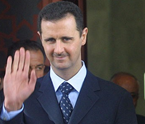(AP) Syria’s Assad says he’s surgeon saving patient
By ZEINA KARAM
Associated Press
BEIRUT
Syrian President Bashar Assad defended his government’s crackdown on opponents Sunday, saying a doctor performing messy emergency surgery does not have blood on his hands if he is trying to save a patient.
In his first speech since January, Assad appeared unmoved by scathing international criticism of his ferocious response to the 15-month-old revolt against his rule, which has killed up to 13,000 people, according to activist groups. He also denied responsibility for last week’s Houla massacre of more than 100 people, saying not even “monsters” would carry out such an ugly crime.
He said terrorists have pushed his country into war.
Assad insisted the revolt was the work of foreign-backed extremists _ not reformers seeking change.
Although the country has faced widespread international condemnation since Syrian troops unleashed a relentless crackdown on protesters last year, a massacre last week in the central region of Houla has brought fresh urgency to solving the crisis.
The opposition and the government have exchanged accusations over the Houla killings, each blaming the other for the house-to-house killings of more than 100 people, many of them small children. U.N. investigators have said there are strong suspicions that pro-regime gunmen are responsible for at least some of the killings.
Assad denied his forces had anything to do with Houla.
Assad did acknowledge the toll the crisis has taken on the country, suggesting all the blood that has been spilled is necessary to root out the forces working to drive him from power.
Members of the Syrian opposition brushed off his comments as meaningless.
Shishakly, the grandson of a former president of Syria, described Assad’s statements on the Houla massacre as “lies to justify the killings because of the immense international pressure on his regime.”
The U.S. has taken advantage over global outrage over Houla to reach out to Syria’s most important ally and protector Russia to join a coordinated effort to resolve the deadly conflict. Until now, Russia, has provided a layer of protection for Damascus, refusing to support any move that could lead to foreign intervention in Syria.
A Russian Foreign Ministry statement issued Sunday said Russia was awaiting the results of the investigation into the massacre at Houla and was “disturbed that some countries went ahead and cast blame.”
Although Assad’s words reflected many of the same general points of his previous speeches _ blaming terrorists and extremists, vowing to protect national security _ his comments on Houla were widely anticipated.
Syria’s uprising began with mostly peaceful protests, but a brutal government crackdown with tanks, machine guns and snipers led many in the opposition to take up arms. Now, the conflict has morphed into an armed insurgency.
The violence has grown increasingly chaotic in recent months, and it is difficult to assign blame for much of the bloodshed as the country spirals toward civil war. The government restricts journalists from moving freely, making it nearly impossible to independently verify accounts from either side.
Assad, 46, who inherited power from his father in 2000, is still firmly in control after more than a year of warfare that has torn at the country’s fabric and threatened to undermine stability in the Middle East.
A cease-fire plan brokered by international envoy Kofi Annan is violated by both sides every day, but Western leaders continue to pin their hopes on diplomatic pressure, with the U.S. and others unwilling to get deeply involved in another Arab nation in turmoil _ particularly one as unpredictable as Syria.
The rebel Free Syrian Army is determined to bring down the regime by force of arms, targeting military checkpoints and other government sites. A U.N. observer team with nearly 300 members has done little to quell the bloodshed.
Al-Qaida-style suicide bombings have become increasingly common in Syria, and Western officials say there is little doubt that Islamist extremists, some associated with the terror network, have made inroads in Syria as instability has spread.
Fears also have risen that the violence could spread and provoke a regional conflagration. Syria’s regional ties make its conflict among the most explosive of the Arab Spring. The regime has alliances with powerful forces including Lebanon’s Hezbollah and Shiite powerhouse Iran.
Already, clashes have broken out between pro- and anti-Syrian groups in northern Lebanon, with at least eight people killed late Friday and early Saturday, Lebanese security officials said.
In Sunday’s speech, Assad said his opponents have ignored his moves toward reform, including a referendum on a new constitution and recent parliamentary elections. He suggested this meant that the call for democracy was not the driving force of the revolt.
Assad has acknowledged there are genuine calls for reform, although the opposition says he has offered only cosmetic changes that do little to change a culture where any whisper of dissent could lead to arrest and torture.
The president said the doors of Damascus were open for dialogue with the opposition _ a key component of Annan’s peace plan _ as long as the parties have no foreign agendas or involvement with terrorism.

COMMENTS
Please let us know if you're having issues with commenting.